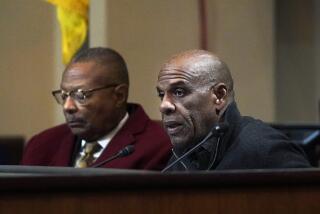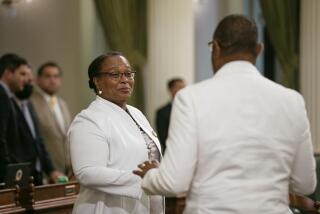Apology for Slavery as First Step in Dialogue
- Share via
Re Karen Grigsby Bates’ two-part “Perspective on Race Relations,” Commentary, Feb. 26:
If you truly wish a productive dialogue on race, it cannot begin with believing your people have a monopoly on being oppressed. While Bates’ ancestors were being enslaved, mine were living in ghettos and being murdered for sport. Most of the white people in America are not the children of slave owners. Most are the children of oppressed people. Most expect no apology or cash payments from the great-great-grandchildren of the original oppressors. It seems a better starting point for getting along.
MICHAEL OLSON
Los Angeles
* Bates mentions a formal apology from the U.S. government, that slavery was a moral abomination. A war was fought to prove that. If an apology were in order I feel it would have far more meaning coming from the individual state governments of former slave states that seceded from the Union.
A few weeks ago I finished reading over 1,000 days worth of diary comments written by my great-great grandfather, a Union Army captain between 1861 until he was forced to resign in late 1864 due to injury and illness. He was never the same man from then until his death in 1885. I wonder what he would have thought of the idea of reparations? He and men like him paid the bill in full for his grandparents’ generation.
J.C. McHARGUE
Los Angeles
* The government of the U.S. does owe an apology to the descendants of enslaved Africans. A sound argument may also be made that African Americans are due recompense for the enforced labor of their ancestors.
American slavery must be dealt with openly. The intergenerational anguish and despair experienced by so many African Americans that appears to result from the legacy of slavery cannot be simply dismissed by whites. Similarly, blacks need to acknowledge that the vast majority of white people in America have no ancestral links to slave owners, indeed not all slave owners were white. The complicit and important role played by black Africans in the slave trade must not be passed over; and the efforts of many white abolitionists cannot be denied.
SHANNON CREAM
Chino Hills
* Slavery existed in the present-day U.S. for nearly 200 years before the government was formed. The government ended slavery. This warrants a governmental apology? As for “an avowal from our Congress that such a thing shall not ever happen again,” it’s called the 13th Amendment.
There is no comparison to the Japanese American intern- ment/reparation. In this case, the transgression was a governmental action.
MICHAEL APOLLO
Glendale
More to Read
Sign up for Essential California
The most important California stories and recommendations in your inbox every morning.
You may occasionally receive promotional content from the Los Angeles Times.













